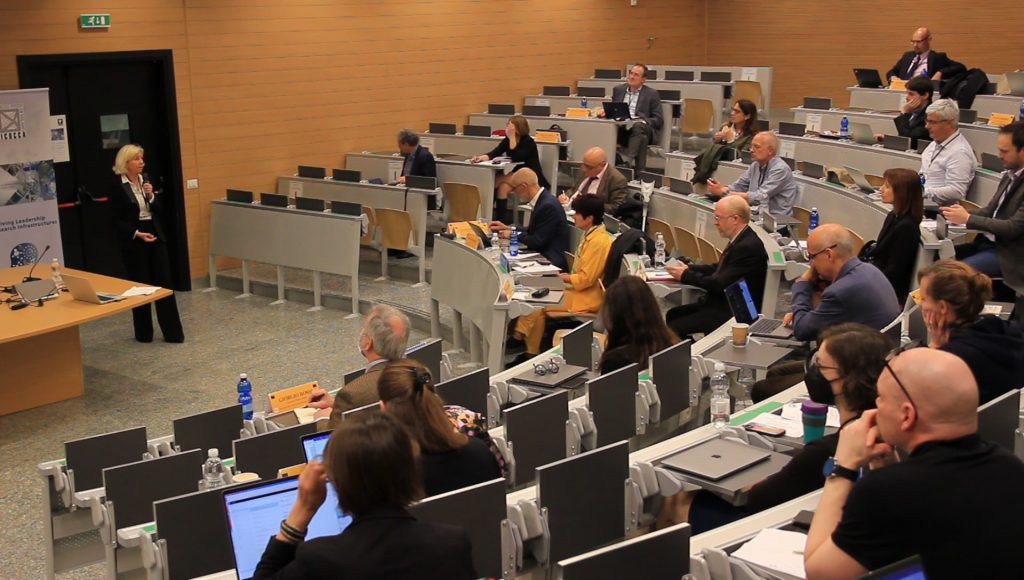
4-5 May 2022, University of Milano-Bicocca – Managing a Research Infrastructure (RI) or a Core facility (CF) is managing a complex enterprise with both scientific and non-scientific stakeholders and a rapidly evolving marketplace. The inter-relationships of RIs and CFs in the same science domain and across domains as well as the need to align to and contribute to the FAIR data approach, to EOSC and to the open science policy impose new competences and skills to manage a systemic evolution of the RI that cannot operate in isolation.
The overarching goal of RITrainPlus is to design a training program to fulfil the competency requirements for the current and future managers of European Research Infrastructures and Core Facilities that are foreseen to be implemented in European universities.
It aims also to establish a European School for Management of Research Infrastructures (ESMRI) to coordinate the continuous development, dissemination, delivery and certification of the learning activities for continuous professional development, and for monitoring and certifying the learning activities embedded in different university tracks and contributing to the European Longitudinal Learning Track.
The aim of RItrainPlus WP5 is to explore the conceptual, legal, and financial requirements to establish a European School for Management of RIs awarding international academic certificates. For this purpose, a meeting was organised on 5 and 6 May 2022 in Milano, Italy hosted by the Milano Bicocca University.
Invited speakers presented ongoing initiatives, past experiences, and best practices to gain an in-depth understanding of the different fields. Aspects such as accreditation, course focus (knowledge, skills, methods, governance, and management practice within RIs), course delivery, training sustainability and specific exchange programmes were covered.
All speakers stressed the necessity to set up specific education and training for RIs and CFs. Below is a short summary of the presentation of different speakers. Carlo Rizzuto stated that managing a RI is managing a complex enterprise with both scientific and non-scientific stakeholders and a rapidly evolving marketplace and stressed the necessity of a European School (ESMRI) to be connected to research on management as management of RI is not subject to deep analysis and there is a lack of theoretical basis for this field. Dominik Sobczak, says that the implementation of the European Research Area has contributed to some major achievements in areas such as Research Infrastructures, open science, international cooperation, gender balance in research and innovation, joint programming, research careers and the mobility of researchers. RI’s established a borderless market for research, innovation and technology across the EU and play a major role in addressing global challenges. The European Council adopted recommendation and actions to deepen the European Research Area. Among the recommendations the coordination of European Union and national investments and reforms in order to strengthen national research and innovation systems and increase their impact at Union level. Among the actions: To promote attractive and sustainable research careers, and inter-sectoral mobility across the ERA; to strengthen sustainability, accessibility and resilience of research infrastructures in the ERA; to enhance the strategic capacity of Europe’s public research performing organisations. These recommendations and actions are in line with the objectives of the European School for Management of RI. Michael Gaebel, mentioned that the School is developing training elements similar to the LLL (Life-Long-Learning) principles which are currently being integrated in European Higher Education. Jana Kolar stressed that “The most important resource for a RI is, arguably, its human capital” and that there is an urgent need to develop measures in support of career diversification and multiple career paths such as the one planned in ESMRI. Enrico Guarini stated that cross-fertilization among RI and CF is an enriching experience for all. For Helen Glaves, capacity building and training are required to make RIs function. For Giorgio Rossi, the diverse blend of scientific and non-scientific requirements of RIs necessitate adequate management & training to lead to success. Ornela De Giacomo mentioned that promotion within RI’s is often linked to scientific success – but the required skill set is along managerial tasks. Antonino Rotolo discussed the development of micro-credentials and Life-Long-Learning experience and the necessity to harmonize training programs.
We have also explored different business models to set up a school, e.g. a federated setup with the School as a shared common service between Member States. Alessandra Gallerano focused on “European degrees/joint programmes/transnational efforts” ongoing at the EU level to bring cooperation to the next level and described the Erasmus Mundus as a driving force for the development of joint programs. Fabrizio Tassinari presented the European University Institute as a model for the setting up of ESMRI. Michael Gaebel mentioned the role of the European University association in facilitating the dialogue and collaboration on higher education as well as research policy and practices. Emilio Urbinati presented the UNA RESIN project that aims to strengthen the research and innovation aspect of Una Europa University alliance, in synergy with the education aspects. It is the first steps towards creating a common R&I eco-system for our researchers and partners from all Una Europa universities. Marialuisa Lavitrano concluded the meeting by stating that the RItrainPlus project will transform the skills-base to drive the professionalisation, efficiency and long-term value creation of European Research Infrastructures and Core Facilities
A report by
George Dagher, Katharina Heil, Lorenzo Merignati, Marialuisa Lavitrano
